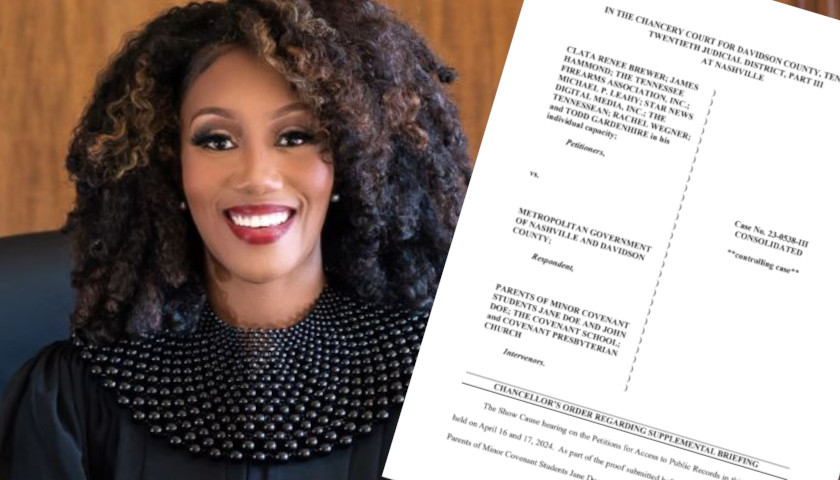The Williamson County Schools Cultural Competency video series that focused on “white privilege” and that teachers had to watch this school year through a required “In-service training” violated more than just Section 49-6-3004 paragraph (c) of the Tennessee Code Annotated.
As The Tennessee Star reported earlier this month, that section of Tennessee law, “makes it clear that every superintendent of a public school district in Tennessee must submit an in-service training plan that has been approved by the local school board to the TDOE by June 1 of the preceding academic year, and that the Commissioner of Education must approve that plan: (emphasis added):
“In-service days shall be used according to a plan recommended by the local superintendent of schools in accordance with the provisions of this section and other applicable statutes, and adopted by the local board of education. A copy of this plan shall be filed with the State Commissioner of Education on or before June 1 the preceding school year and approved by him.” (emphasis added)
But WCS Superintendent Mike Looney, who was responsible for the development and delivery of The Williamson County Schools Cultural Competency video series, has produced no evidence that he (1) prepared an in-service plan for academic year 2018-2019, (2) received approval of that plan from the WCS School Board, (3) submitted that plan to the Tennessee Department of Education, or (4) received approval of that plan from then-Commissioner of Education Candace McQueen.
The video series also violated Tennessee State Board of Education guidelines that require that all in-service training and professional learning delivered to teachers to “align . . . with . . . student curriculum standards.”
The Tennessee Code Annotated specifies those guidelines in Section 49-6-3004 paragraph (d). That portion of the code states: “The state board of education shall develop a policy governing professional development activities during in-service education within the guidelines adopted.”
Section 49-6-3004 was apparently included in the Tennessee Code Annotated in 1992. This, after members of the Tennessee General Assembly sent the Education Improvement Act (EIA) to former Democratic Gov. Ned McWherter. McWherter signed it into law.
That bill established a new method of funding for Tennessee Schools, known as the Basic Education Plan (BEP), and it also changed the method to select local school superintendents. Prior to 1992, voters in most Tennessee counties elected their school superintendents. After the EIA passed, local school boards appointed the superintendent of schools in their areas.
Section 49-6-3004 appears to come from language in the EIA that officials designed to provide checks and balances on the powers of the now-appointed superintendents of schools.
Shortly after the EIA’s passage, the Tennessee State Board of Education (TSBE) complied with that part of Tennessee law and developed “a policy governing professional development activities during in-service education within the guidelines adopted.”
You can read that TSBE policy, established in 1992, and in force for the subsequent 27 years, here.
Of interest to the situation in Williamson County Schools and their “white privilege” training is what appears on page 2 of that policy.
“OUTCOMES: Professional learning that increases educator effectiveness and results for all students aligns its outcomes with educator performance and student curriculum standards,” the TSBE policy states clearly. (emphasis added)
On Monday, The Star asked a spokesperson for the TSBE the following questions about the Williamson County Cultural Competency series:
1. How does the “white privilege” training provided in the Williamson County Cultural Competency series “align its outcomes with . . . student curriculum standards.” ?
2. Where is “privilege theory” or “white privilege” currently contained in Tennessee student curriculum standards?
3. Where is “privilege theory” or “white privilege” currently contained in the Tennessee Code? Please provide citations
Additionally, can you identify any administrative or legal proceeding that has introduced “white privilege” as evidence or memorialized the concept in any legal fashion?
If so, please provide citations.
4. If the preceding is in the negative, how can this “white privilege” concept be administered by a school system, and how does it effect student outcomes?
TSBE spokeswonan Elizabeth Tullos responded to all four of The Star’s questions, and said in an emailed statement received late Monday afternoon that “there is no mention of ‘white privilege'” in a review of the TSBE’s academic standards for English language arts, math, science, social studies, and health, as well as the school counseling standards adopted since 2016.
“‘White privilege’ is not mentioned in the State Board of Education’s academic standards. Again, our agency develops the statewide academic standards and local school districts establish their own curriculum,” Tullos said.
“Standards outside the scope of the State Board of Education’s review process, such as Advanced Placement and dual enrollment courses offered through colleges, could potentially cover this topic, but our agency does not develop those standards.”
The issue of “white privilege” and where it is in Tennessee Code is something Tullos said “is outside the scope of the State Board of Education’s authority.”
Tullos said the same when asked about any administrative or legal proceeding that has introduced “white privilege” as evidence or memoralized the concept in any legal fashion.
The TSBE’s currently in effect social studies standards do not include the topic of “white privilege.”
The current standards for United States Government and Civics courses taught in Tennessee’s public high school classes make no reference to “privilege theory” or “white privilege.” Instead they state that “Students will study the purposes, principles and practices of American government as established by the Constitution.”
Students are expected to understand their rights and responsibilities as citizens and how to exercise these rights and responsibilities in local, state, and national government. Students will learn the structure and processes of the government of the state of Tennessee and various local governments. The reading of primary source documents is a key feature of United States Government and Civics standards.
The current standards for United States History and Geography: Post-Reconstruction Period to the Present courses taught in Tennessee’s public high school classes make no reference to “privilege theory” or “white privilege.”:
Students will examine the causes and consequences of the Industrial Revolution and America’s growing role in world diplomatic relations, including the SpanishAmerican War and World War I. Students will study the goals and accomplishments of the Progressive movement and the New Deal. Students will also learn about the various factors that led to America’s entry into World War II, as well as its consequences for American life.
Students will explore the causes and course of the Cold War. Students will study the important social, cultural, economic, and political changes resulting from the Civil Rights Movement, the
Cold War, and recent events and trends that have shaped modern-day America. Additionally, students will learn the causes and consequences of contemporary issues impacting their world today.Students will continue to use skills for historical and geographical analysis as they examine American history since Reconstruction with special attention to Tennessee connections in history, geography, politics, and people. Students will continue to learn fundamental concepts in civics, economics, and geography within the context of United States history. The reading of primary source documents is a key feature of United States history standards. Finally, students will focus on current human and physical geographic issues important in contemporary America and the global society.
The WCS School Board is scheduled to meet in Franklin tonight at 6:30 p.m., at which time it is expected to address the topic of the “white privilege” concepts presented in the Williamson County Cultural Competency series of in-service training videos for teachers in the system.
– – –
Chris Butler is an investigative journalist at The Tennessee Star. Follow Chris on Facebook. Email tips to [email protected].









[…] Williamson County subjected teachers to a series of in-service instructional videos focused on “Cultural Competency,” which included at least one video denouncing so-called “White Privilege” as a major problem […]
I sure think its interesting that the SPLC has imploded in the last week, yet the Superintendent subscribed to their training, even to the degree of sending teachers to a workshop. He defended the organization even as the hypocrisy among the founders/leaders of SPLC has been exposed. What an example of the importance of basing education on facts rather than emotion.